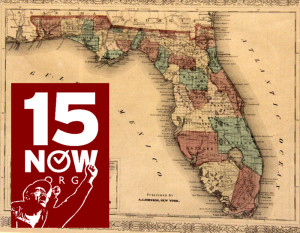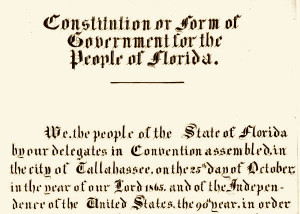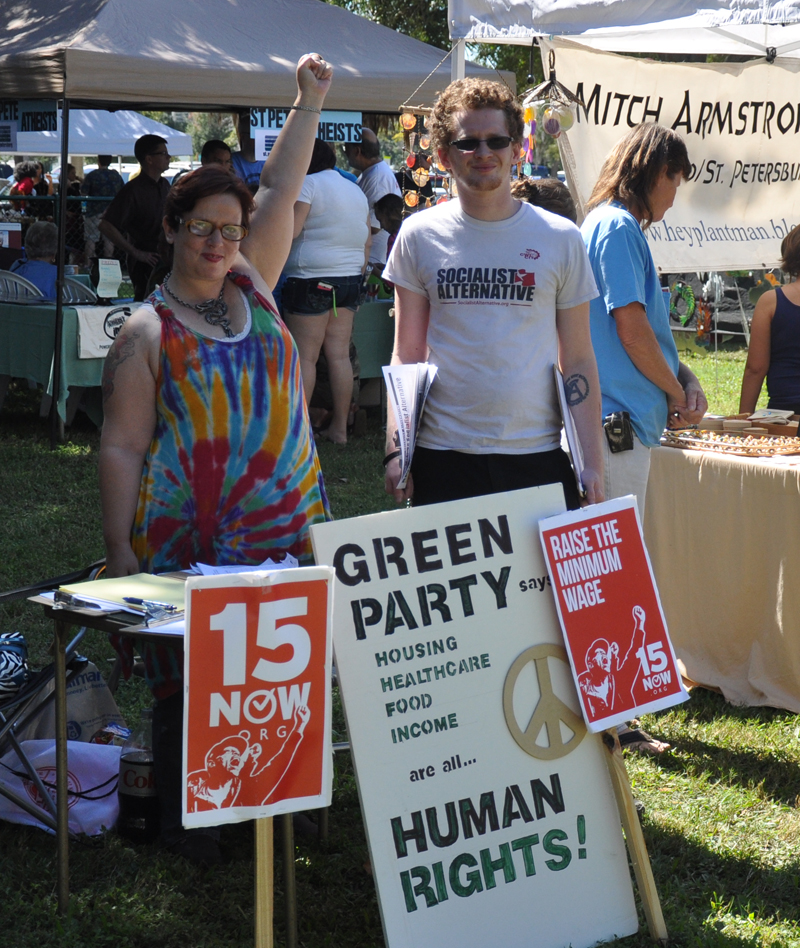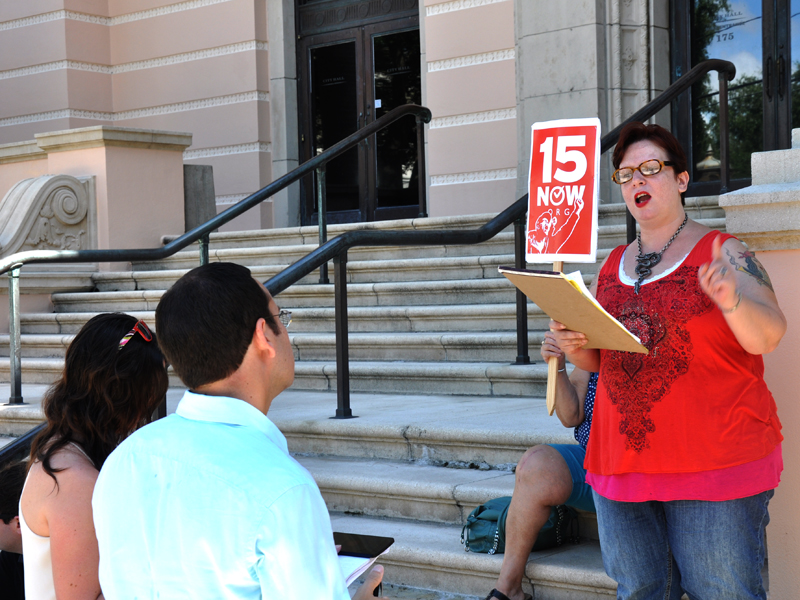 Florida, like the rest of the South, is going to be a tough nut to crack. Like much of the South, it is a right-to-work state with a solidly Republican state legislature. Furthermore, Florida statute 218.077(2) forbids local jurisdictions from passing any minimum wage or other employee benefits in excess of those mandated by state or federal law.
Florida, like the rest of the South, is going to be a tough nut to crack. Like much of the South, it is a right-to-work state with a solidly Republican state legislature. Furthermore, Florida statute 218.077(2) forbids local jurisdictions from passing any minimum wage or other employee benefits in excess of those mandated by state or federal law.
From the git-go, we were told that the cause of the $15/hour minimum wage was doomed. 218.077(2) trumped everything, and that was that. We could support the efforts of SEIU’s Fight for 15 to organize fast-food workers in Tampa, or support city workers in St. Petersburg in their demand for a $15 minimum for themselves. But flying in the face of all reason, we determined that we would challenge 218.077(2) straight-on.
However, that didn’t mean just going full kamikaze. We had discussions. A statewide ballot initiative was considered and rejected. For instance, organizers for this year’s statewide Medical Marijuana initiative had turned in over 1.1 million signatures to qualify it for the state ballot, but we had no base for such a massive endeavor. So how to throw down the gauntlet in a manner commensurate with our modest means?
It’s in the Constitution
 We were inspired by Article X, Section 24(a) of the Florida state constitution, which stated:
We were inspired by Article X, Section 24(a) of the Florida state constitution, which stated:
“(a) PUBLIC POLICY. All working Floridians are entitled to be paid a minimum wage that is sufficient to provide a decent and healthy life for them and their families, that protects their employers from unfair low-wage competition, and that does not force them to rely on taxpayer-funded public services in order to avoid economic hardship”
We put in hours studying the relevant laws, determined that 218.077(2) was unconstitutional, and then drafted a resolution for the 8-member St. Petersburg City Council:
“NOW THEREFORE, BE IT RESOLVED by the City Council of the City of St. Petersburg, that the Council calls for the Legislature of the State of Florida to repeal Statute 218.077(2), and immediately upon such repeal, the Council will move to set a minimum wage of $15 an hour for all workers without exception and without delay in implementation.”
We call it the Maria Fernandes Resolution, named after the woman who died from gas fumes while sleeping in her car.
Note that it makes two points. There is of course the call for 15. But essential to actually winning 15, and hopefully compelling, in terms of putting pressure on liberal Councilmembers was the bourgeois-democratic argument for Home Rule and the city’s right to set its own minimum.
An organizer for the Florida Public Services Union (FPSU) gave us a copy of their media list. We wrote a press release announcing a September 27 press conference on the steps of City Hall, and sent it to every outlet around the state. We followed up with phone calls to individual reporters and newsrooms. At the conference itself, five of us from 15 Now and two reporters showed up, one from an area alternative newspaper called Creative Loafing, and the other from the Tampa Bay Times, the major newspaper in the area. Rose Roby and I both spoke. “15 Now challenges City Hall (1)” and “15 Now Challenges City Hall (2).” As I stated on the City Hall steps, “We’re not calling on the St. Petersburg City Council, as it said in the Declaration of Independence, to risk their lives, or even their fortunes. We’re not asking them, not yet, anyway, to spend any money, meaning our own tax money. But we are wondering about their sacred honor.”
Result: two friendly newspaper articles and three radio interviews.
And into the streets
Next step: We drew up a petition, then we hit the streets. Since it was a petition of support and not a ballot initiative, validity rates were not an issue. The purpose was not just to impress the City Council. It was to tell the community that we wanted them — the people nobody listened to — to have a voice. Folks would say “I’m not registered.” Doesn’t matter. Sign it. “I’m not a citizen.” 15 is for everybody. Sign. “I’m retired.” Sign it for your children. “I’m on work release.” Doesn’t matter. You can be part of this movement. They sign. The responses, particularly in the Black community, drove us even harder.
 With a couple hundred signatures under our belt, we contacted individual City Councilmembers and asked to meet with them. Four of them (Dudley, Nurse, Gerdes and Kornell) agreed to meet. One was downright negative, other responses ranged from cautious, to skeptical, to supporting us. Repeal of 218.077(2) was popular, but “move to set a minimum wage of $15” was dicier.
With a couple hundred signatures under our belt, we contacted individual City Councilmembers and asked to meet with them. Four of them (Dudley, Nurse, Gerdes and Kornell) agreed to meet. One was downright negative, other responses ranged from cautious, to skeptical, to supporting us. Repeal of 218.077(2) was popular, but “move to set a minimum wage of $15” was dicier.
We were taken seriously. The meetings gave us ammunition on the street, about our professionalism, about our at least being heard. It has put us on the map.
We are beginning to develop political relationships. FPSU has been invaluable with advice and encouragement, and we hope for an endorsement. SEIU sees us adding pressure on the city in their contract negotiations.
For late November, we are looking forward to directly addressing the City Council at its open mike session, with more media outreach, and a possible rally on the City Hall steps. By the end of the year, we should have some 1,500 signatures, and we can insist that the Council take up the legislation.
What if they turn it down completely? Tough question. Even tougher question, what if they do pass it? Myriad open questions.
One way to look at it is that if it passes, we tout our victory and use it to leverage whatever our next move would be. If it doesn’t pass, it gives us more time to keep petitioning and building our base for future challenges. Win-win. What is certain is that we need to bust our asses in the next few months while our momentum builds. We have to create a more developed infrastructure off our petitioning base.
And we can now ask, to what do we owe our limited success? It is indeed a “success,” but we cannot forget the “limited” aspect of the equation. We haven’t achieved it because we are so strong. We are still a handful. It’s not that we are so devilishly clever. Our moves have been simple. The press conference was invented the day after they invented the clay tablet. Alexander Graham Bell invented the telephone back in 1876.
Three factors:
(1) 15 is hot! It got us entrée with the press, the FPSU, and the City Council by dint of the name only.
(2) We took our petition directly into the community. In this era of effortless (and impotent) online petitions and millennial Twitter snake oil, it has set us apart from the rest of what I would call the soft, lazy and demoralized left.
(3) We embrace electoral politics as a primary weapon. By virtue of our relations with the Green Party of Florida (GPFL), which has ballot status in the state, and the fact that 15 Now is the major project of the GPFL’s St. Pete and Orlando locals, that threat is quite credible.
 In meeting with City Council members, we point out that four Council districts are in play in 2015:
In meeting with City Council members, we point out that four Council districts are in play in 2015:
Charles Gerdes
Bill Dudley
Steve Kornell
Wengay Newton (term-limited out of office next year)
We also note that in 2016, half the Florida Senate and all 120 Florida House seats in the state legislature are up for grabs, and this year, 15 of 20 seats for State Senate were unopposed, and 69 of the 120 had only one major party contender. When we present 1,500 signatures at year end, we will hardly neglect to point out that, aside from 1,500 is so cleverly 100 x 15, it is also the number required, even with a conservative projected validity rate, to file a candidate for the Florida House. No, the GPFL is hardly a powerhouse, but when we reminded one of the more liberal City Council members that his seat was in play next year, there was a “deer in the headlights” moment followed by a quick “Don’t do that.”
Fighting for 15, and Fight for 15
Fight for 15 is one of the leading organizations in the 15 movement. Are 15 Now and Fight for 15 rivals? Hardly. Relations had perhaps been uneasy between us and SEIU’s Fight for 15 organization, which is active in Tampa, organizing especially among fast food workers. 15 Now Tampa Bay and the newly formed 15 Now Central Florida, out of Orlando, showed up in some force at Fight for 15’s September 4 action in Tampa, where people briefly blocked a major street in Tampa’s Temple Terrace. Lately, Fight for 15 has invited us to support their upcoming December 4 actions, and to be part of a coalition supporting Becky Rubright for Mayor and Joe Redner for City Council in Tampa’s upcoming non-partisan elections in March. Both Rubright and Redner will campaign on the $15 minimum. We intend to ask them to also explicitly raise the issue of 218.077(2), taking our resolution beyond St. Petersburg.
What has now become clear is that Fight for 15 has the “boots on the ground,” fighting for particular workers, while 15 Now, fighting for a 15 minimum wage, seeks a legislative solution, both locally and statewide, 15 for everyone. It creates a proper division of labor where we reinforce each other.
 Green for 15
Green for 15
While the GPFL is not terribly strong as electoral parties go, it is the strongest left-wing political party in the state and in the country. Per the 2012 independent election results:
| Jill Stein (Green) | 469,628 |
| Roseanne Barr (Peace & Freedom) | 67,326 |
| Rocky Anderson (Justice) | 43,018 |
| Stewart Alexander (Socialist) | 4,430 |
That’s 469,628 for Stein to 114,774 for the rest, 4 to 1.
We hope to use the GPFL’s infrastructure to help spread 15 Now throughout the state. GPFL members in Orlando were instrumental in founding 15 Now Central Florida, which is drafting a local resolution based on St. Pete’s. GPFL locals in Alachua County (Gainesville) and Miami are moving towards taking up 15 Now, and Didier Ortiz, Green Party candidate for City Commission District 3, has been campaigning for 15 in Fort Lauderdale.
We know that Florida is going to be a very tough nut to crack. The state legislature is overwhelmingly reactionary Republican, the Democratic Party a pathetic shell, despite the fact that Obama won the state in 2008 and 2012. The disparity between the political superstructure and the progressive base is potentially explosive.
Low-hanging fruit
So the state legislature is a ripe target around the issue of repealing 218.077(2), particularly the Florida House where only some 1,200 valid signatures are required to qualify a candidate for 2016. As mentioned, this year, 69 of the 120 House seats are going unchallenged by one or the other major party, and the GPFL’s ballot status creates the opportunity to make 218.077(2) a household word around the state.
Democratic and Republican honchos seem to have reached a gentleman’s agreement to save money and effort by divvying up over half the state in advance. And once a party lets itself so atrophy, it’s not so easy to get back In the saddle should an independent threat arise.
As the table below shows, this pattern is repeated throughout the South.
| state | unopposed | total seats | pct |
| Florida Senate: | 15 | 20 | 75.0% |
| Florida House: | 69 | 120 | 57.5% |
| Alabama Senate: | 18 | 35 | 51.4% |
| Alabama House: | 65 | 105 | 61.9% |
| Arkansas Senate: | 15 | 18 | 83.3% |
| Arkansas House: | 29 | 37 | 78.4% |
| Georgia Senate: | 41 | 56 | 73.2% |
| Georgia House: | 147 | 180 | 81.7% |
| Louisiana Senate: | 18 | 39 | 46.2% |
| Louisiana House: | 41 | 105 | 39.0% |
| Mississippi Senate: | 19 | 52 | 36.5% |
| Mississippi House: | 60 | 122 | 49.2% |
| North Carolina Senate: | 21 | 50 | 42.0% |
| North Carolina House: | 61 | 120 | 50.8% |
| Oklahoma Senate: | 13 | 25 | 52.0% |
| Oklahoma House: | 66 | 101 | 65.3% |
| South Carolina Senate: | 31 | 46 | 67.4% |
| South Carolina House: | 93 | 124 | 75.0% |
| Texas Senate: | 7 | 15 | 46.7% |
| Texas House: | 105 | 150 | 70.0% |
| totals | 934 | 1,520 | 61.4% |
 Thus, in many districts, an energetic independent left party of whatever stripe has the potential within the decade to become the “other” party in district after district. Keep in mind that, while these states are under the thumb of the Republicans, their people are desperately poor. 15 Now can be the issue that allows left parties like the Green Party to mobilize the kind of electoral base among poor and working people that they currently lack, using appropriate versions of the St. Pete model discussed above.
Thus, in many districts, an energetic independent left party of whatever stripe has the potential within the decade to become the “other” party in district after district. Keep in mind that, while these states are under the thumb of the Republicans, their people are desperately poor. 15 Now can be the issue that allows left parties like the Green Party to mobilize the kind of electoral base among poor and working people that they currently lack, using appropriate versions of the St. Pete model discussed above.
Nixon had his “Southern Strategy.” We have ours.
— submitted by Jeff Roby
15 Now Tampa Bay Outreach Coordinator
Secretary of the St. Pete local of the GPFL



[…] via Report from the Florida Front | St Pete Local. […]